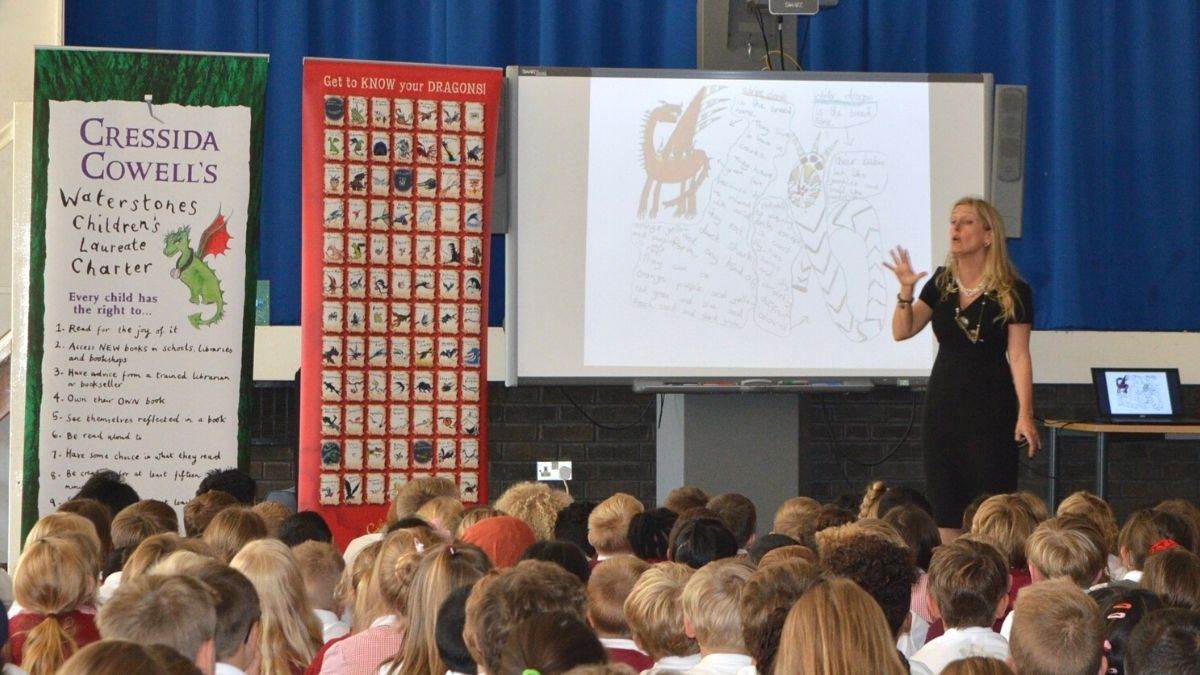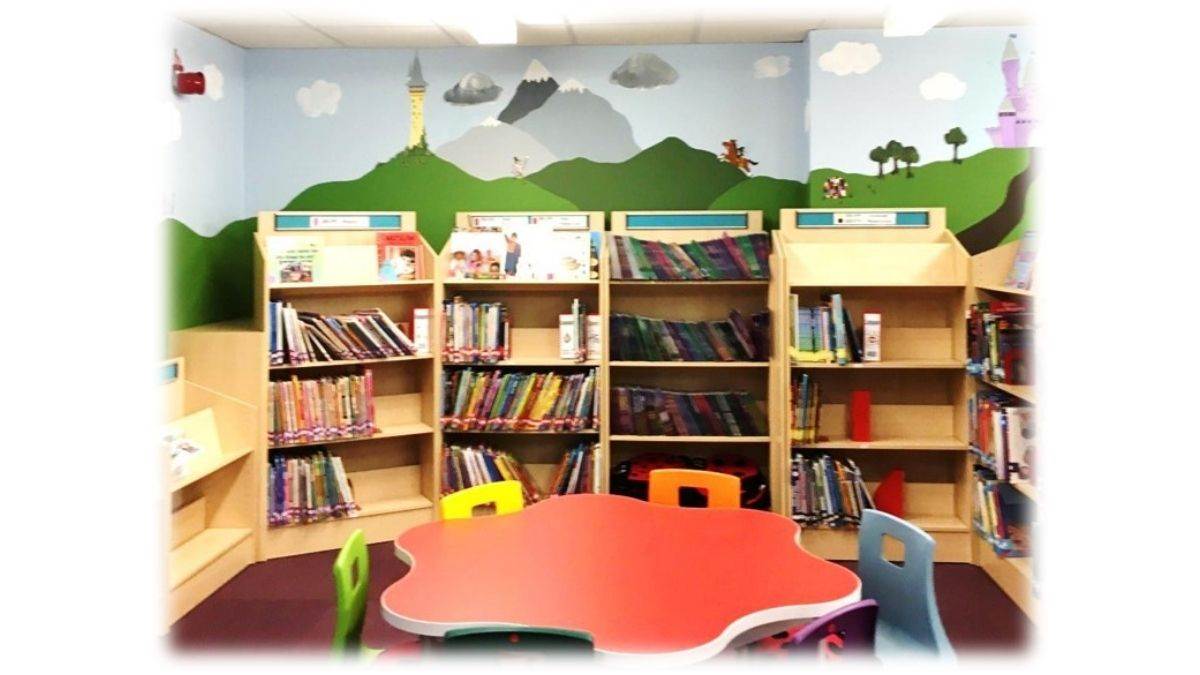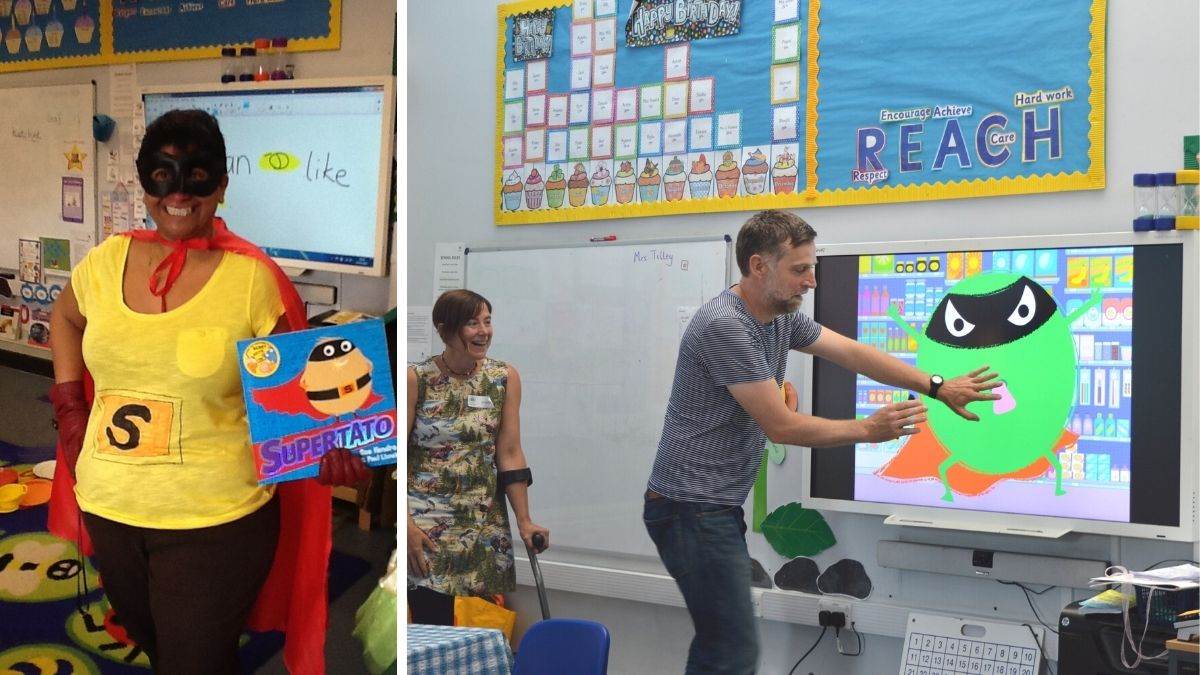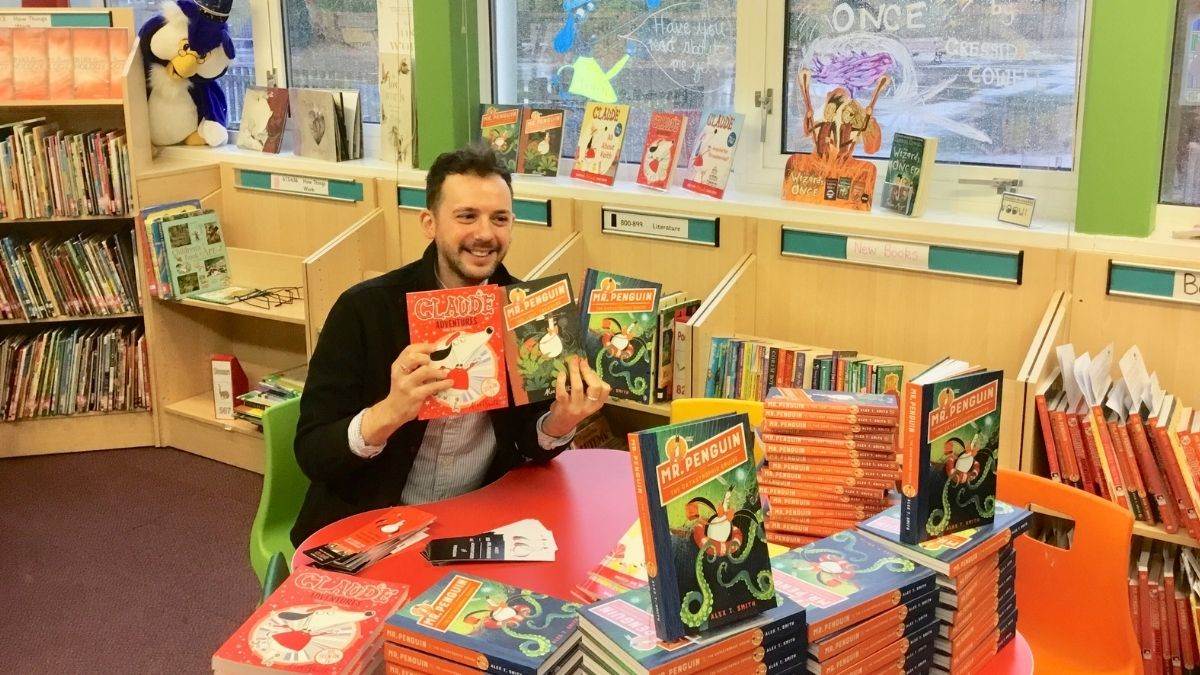A Year of Reading Activities: How this primary school put the love back into its library
Published on: 28 June 2021
Assistant headteacher Deborah Texeira wanted to get the children at her primary school to develop a habit of reading for pleasure - so she devised a whole year's worth of fun reading activities and author visits! Here's how she got on.
 Cressida Cowell visiting Deborah's school
Cressida Cowell visiting Deborah's school
At my current school, reading is at the heart of the curriculum - it is the bedrock of the children’s education. I have been the reading lead for three years now and have taken the staff and pupils on a Reading Journey. Reading has never been a problem at our school but it had become dull and uninteresting. The library was tired and children were not inspired to become lovers of books. So, I set about the task of putting the LOVE back into Reading at Paddox Primary.
A Year of Reading at Paddox Primary School
Since 2015, we have focused on a different topic for the year. So far we have done Music and Science. We dedicate the whole year to this subject and organise events for children and parents. This helps to raise the profile of these subjects, which has proved to be highly successful from the feedback we have received.
In 2018 we chose the Year of Reading. Why? Mainly because the younger generation of parents are finding it increasingly difficult to engage with books, due to technology such as tablets and smart phones. Many parents have shared that they do not know how to support their children with learning to read. Parents see successful reading as focusing on book bands eg: the higher the level/band the better the reader their child is! So, two of our main focuses for the Year of Reading were:
-
Developing a love of reading of quality texts in our children
-
Supporting parents to engender that love of reading in their children.

Deborah's school library
As a school we have a strong reading culture but our data doesn’t reflect this. Whilst our results are still higher than the national average, they could be better to reflect this strong reading culture. When we looked a bit more into what the issues were we found that our children can decode texts very well but their inference and comprehension skills were weak. So, our children were not really reading for enjoyment. Reading in school was becoming boring and challenging for them. Whilst many of our children read freely for pleasure, there were just as many children who were being turned off because of books they saw as boring.
 Authors Sue Hendra and Paul Linnet at a Supertato-themed day
Authors Sue Hendra and Paul Linnet at a Supertato-themed day
Getting other staff on board
All staff were on board as are parents and governors. We had an enthusiastic Year of Reading Committee who helped organise the various events. We all understood how important the love of reading is.
Here was our action plan:
- Complete revamp of the school library which previously was only non-fiction. It has doubled in size and now houses a fabulous fiction section. It has been completely re-decorated with book characters by teachers during their holidays. The fiction section is now home to portraits of staff who dressed up as Harry Potter characters and were professionally photographed! The library catalogue system has been updated and every book catergorised. Children have been trained to use the Junior Librarian system.
- We now have regular Library clubs at lunchtime where children can come and spend time in the library and borrow a book to take home.
- All classes now have a dedicated time to visit the library when the choose a book to take home and also listen to a story.
- All classes now have a class reader which the teacher will read to the class every day for at least 15 minutes.
- KS2 Reading homework is set based on the National Curriculum objectives for reading. This will ensure that our children will really understand the texts they are reading.
- Every class has “Meet the Author” each half term. This is when each year group will learn about a particular author and that genre of writing. They might compare that writing style to others that may be similar.
- We are organising by request a Parents Book Club which will be held after school. This will be run by parents for parents.
- We have a Carnegie and Greenaway CILIP Shadowing Group.
- New Guided books have been bought to inspire the children to enjoy reading.
- Paddox after Dark – Year 5&6 children come back to school and have scary stories by candlelight.
- Campfire Stories – Year 3&4 children have stories by a campfire with marshmallows and hot chocolate.
- Teddy Bears' Picnic – Reception and KS1 come with their favourite cuddly toy and listen to teachers read popular stories.
- Sleepover in school for one night in October with a Ghost theme and visit from Chris Priestley.
- Sponsored readathon
- Poetry Slam
- The main event was a mini Hay in Day Literary Festival on July 5th 2018. This was the most fantastic day which was brought together the whole school and one that will not be forgotten. We worked closely with Kenilworth Books, an independent bookshop about 15 miles away from our school. I wrote to several authors and illustrators to ask them to take part in our festival. To our amazement and incredibly small budget we secured 5 amazing authors and illustrators. They included MG Leonard, Paul Linnet and Sue Hendra, David Melling, Graham Jones and Zenon Texeira. The day compromised of workshops for every child in the school. At the end of the day the children were able to buy signed books by our guests at a pop book shop. This was just the beginning of a journey of wonderful Author and Illustrator visits.
 Author Alex T. Smith at an author visit.
Author Alex T. Smith at an author visit.
Budgeting and resources
We are very fortunate as our PTA (Friends of Paddox) funded the revamp of the school library. We had a small budget which allowed us to pay our visitors to the Literary Festival travelling expenses as most waved their fee.
You might also like...
How to get children engaged with their school library
Waterstones Children's Laureate: Frank Cottrell-Boyce
Frank Cottrell-Boyce is the Waterstones Children's Laureate for 2024-26.
The role of Children's Laureate is awarded once every two years to an eminent writer or illustrator of children's books to celebrate outstanding achievement in their field. Find out what Frank's been up to.





